When pondering the question of whether cats can eat tuna, a myriad of considerations come into play, prompting discerning pet owners to pause before reaching for that can opener.
The allure of offering this seafood staple to our feline companions is undeniable, yet beneath the surface lies a complex landscape of nutritional nuances and potential pitfalls.
As we navigate the realm of feline dietetics and delve into the implications of incorporating tuna into our cats' meals, it becomes evident that a deeper understanding of this matter is essential for the well-being of our beloved pets.
Key Takeaways
- Tuna offers nutritional benefits but poses risks like mercury poisoning and allergies for cats.
- Moderation is key when feeding tuna to cats to prevent nutrient imbalances and health issues.
- Different types of tuna vary in nutrient content and mercury levels, impacting a cat's diet.
- Understanding feline dietary needs and balancing tuna treats with a complete diet is crucial for cat health.
Nutritional Benefits of Tuna for Cats
Being rich in vitamin B12, omega-3 fatty acids, and vitamin D, tuna offers valuable nutritional benefits for cats. Vitamin B12 supports a cat's neurological function and aids in the formation of red blood cells. Omega-3 fatty acids contribute to healthy skin and a shiny coat, reducing inflammation and supporting cognitive function.
Vitamin D is essential for calcium absorption and bone health, crucial for feline mobility and overall well-being. These nutrients in tuna can complement a cat's diet, providing essential elements that may be lacking in other foods. However, it is important to balance tuna consumption with potential risks, ensuring that cats enjoy this treat in moderation to maintain their health and vitality.
Potential Risks of Tuna for Cats
While tuna can offer valuable nutritional benefits for cats, it is important to be aware of the potential risks associated with feeding tuna to feline companions.
- Tuna allergies may cause digestive issues or skin problems in some cats.
- High levels of mercury in certain types of tuna can lead to poisoning over time.
- Tuna that is not cooked properly may contain harmful bacteria affecting cats.
- Excessive tuna consumption can result in nutrient imbalances in a cat's diet.
- Regularly feeding tuna can cause cats to become dependent on its strong flavor, leading to picky eating habits.
Signs of Mercury Poisoning in Cats
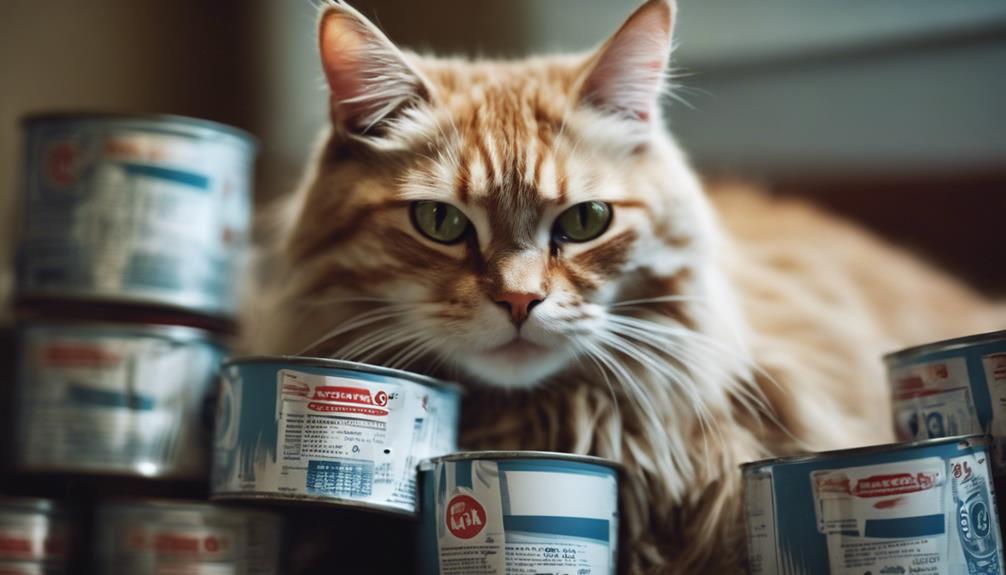
Mercury poisoning in cats can manifest through noticeable signs such as loss of coordination and vision impairment. Monitoring your cat for these symptoms is crucial if you suspect mercury toxicity. Below is a table summarizing common signs of mercury poisoning in cats for quick reference:
| Signs of Mercury Poisoning in Cats | Description |
|---|---|
| Loss of coordination | Unsteady movements |
| Vision impairment | Difficulty seeing clearly |
| Excessive drooling | Dripping saliva |
| Weakness | Lethargy and lack of energy |
If your cat exhibits any of these signs, consult your veterinarian immediately for proper diagnosis and treatment. Remember, being attentive to your cat's health is essential in ensuring their well-being.
Moderation in Feeding Tuna to Cats
In considering the nutritional benefits and risks associated with feeding tuna to cats, it is essential to emphasize the importance of moderation in their tuna consumption. When feeding tuna to your feline friend, keep the following points in mind:
- Introduce tuna as a flavoring or occasional treat.
- Be mindful of the varying nutrient and mercury levels in different types of tuna.
- It is recommended to cook tuna before feeding it to your cat.
- High levels of mercury and unsaturated fats can be found in tuna, especially albacore.
- Tuna should not be a regular meal but rather a rare treat or an ingredient in balanced cat food.
Varying Nutrient Levels in Tuna
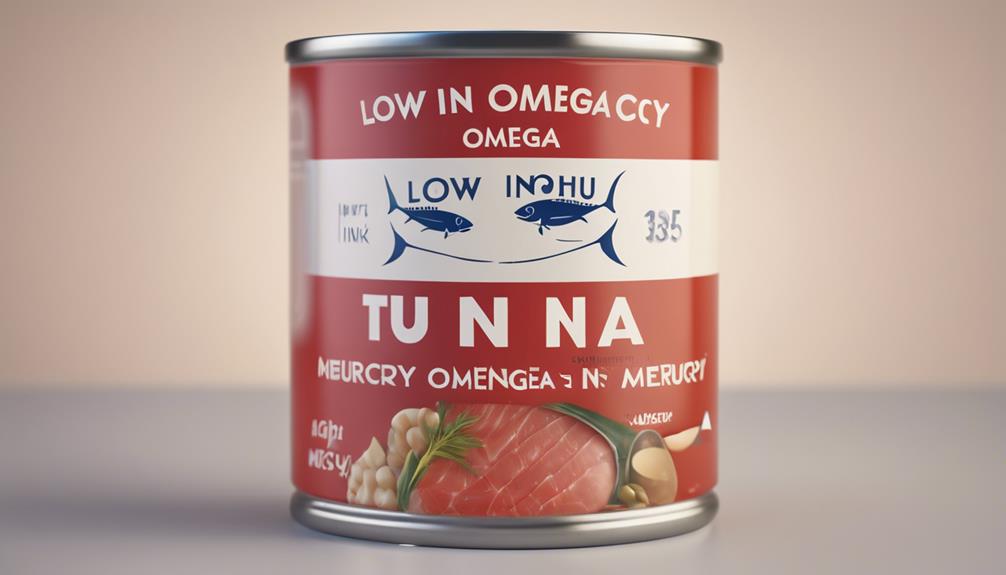
When considering the nutritional value of tuna for cats, it is important to note the varying nutrient levels present in different types of this fish. Some types of tuna may have higher levels of certain nutrients while others contain more mercury. Here is a comparison of the nutrient content in different types of tuna:
| Type of Tuna | Protein Content | Omega-3 Fatty Acids | Mercury Level |
|---|---|---|---|
| Bluefin | High | High | Moderate |
| Yellowfin | Moderate | Moderate | Low |
| Albacore | High | High | High |
| Skipjack | Moderate | Low | Low |
Understanding these differences can help you make informed decisions when choosing which type of tuna to feed your cat.
Importance of Cooking Tuna for Cats
Cooking tuna before feeding it to cats is recommended to enhance digestibility and reduce potential health risks associated with raw fish consumption. When preparing tuna for your feline friend, consider the following:
- Eliminates harmful bacteria: Cooking kills bacteria that may be present in raw fish.
- Improves palatability: Cooking enhances the aroma and flavor of tuna, making it more appealing to your cat.
- Reduces risk of mercury poisoning: Cooking can reduce mercury levels in tuna, making it safer for consumption.
- Enhances nutrient absorption: Cooking breaks down proteins and fats, aiding in better nutrient absorption.
- Prevents digestive issues: Cooking makes tuna easier for cats to digest, reducing the likelihood of gastrointestinal problems.
Quantity and Frequency of Tuna
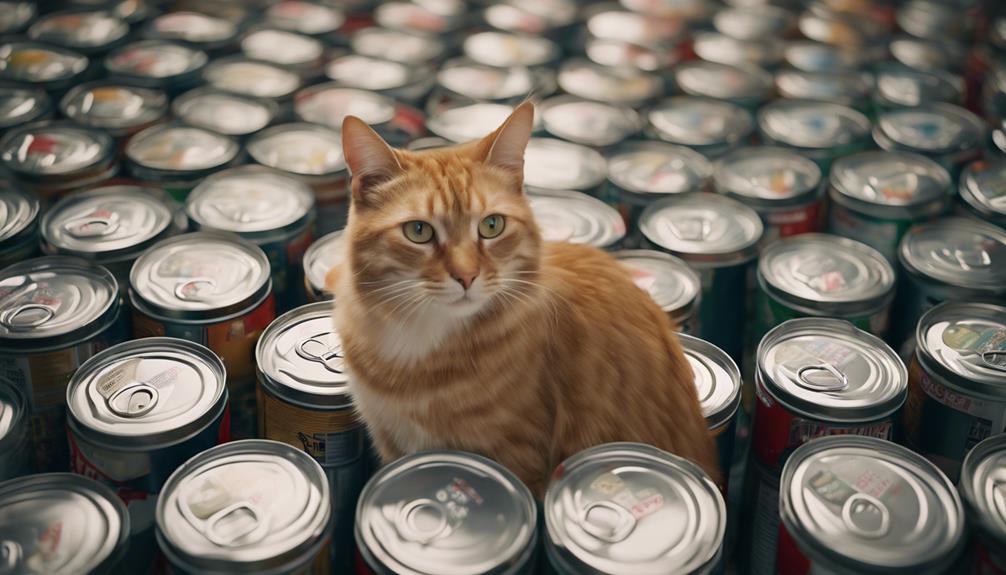
Considering the significance of maintaining a balanced and safe diet for feline companions, determining the appropriate quantity and frequency of tuna in their meals is crucial for their overall well-being. Tuna should be given in moderation, not as a regular meal, due to its potential risks such as mercury poisoning and nutritional imbalances.
It is recommended to offer tuna as a rare treat or as an ingredient in balanced cat food. While tuna can be a flavorful addition to their diet, it is essential to be mindful of the frequency of consumption to prevent any adverse effects on their health. Additionally, incorporating tuna-flavored cat foods, which are balanced and complete, can be suitable for occasional indulgence in a safe manner.
Tuna Juice for Hydration
Tuna juice can serve as a beneficial addition to a cat's water bowl to promote hydration. Cats are sometimes finicky about drinking water, but the addition of tuna juice can entice them to stay hydrated. Here are some key points to consider:
- Tuna juice provides a flavorful incentive for cats to drink more water.
- Hydration is crucial for urinary tract health and overall well-being.
- Mixing tuna juice with water can make it more appealing and encourage increased fluid intake.
- Ensure the tuna juice is diluted to prevent excessive salt intake.
- Monitor your cat's consumption to prevent overindulgence and maintain a balanced diet.
Tuna-Flavored Cat Foods
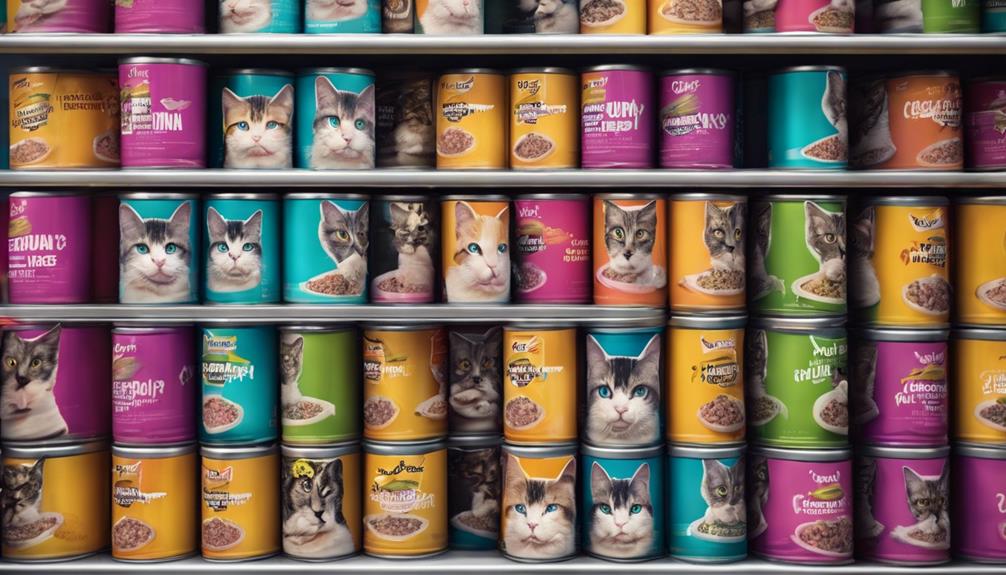
When looking for a convenient and palatable dietary option for feline companions, exploring tuna-flavored cat foods can be a beneficial choice.
Tuna-flavored cat foods offer a tasty alternative for cats that enjoy the flavor of tuna without the risks associated with feeding them raw tuna. These commercially available cat foods are specially formulated to provide the necessary nutrients cats need for a balanced diet while satisfying their cravings for fish.
It is essential to choose high-quality tuna-flavored cat foods from reputable brands to ensure that they meet the nutritional requirements of your feline friend. Introducing tuna-flavored cat foods as an occasional treat can be a delightful addition to your cat's mealtime routine.
Tuna as a Rare Treat
With moderation being key in feline dietary choices, incorporating tuna as an occasional indulgence for cats can offer a flavorful diversion in their meal repertoire.
- Tuna provides a delicious change from regular meals.
- Feeding tuna in small amounts prevents nutritional imbalances.
- Moderation ensures cats enjoy the treat without health risks.
- Offering tuna infrequently maintains its appeal for cats.
- Balancing tuna treats with a complete diet promotes overall health and wellness.
Related Articles on Cat Nutrition
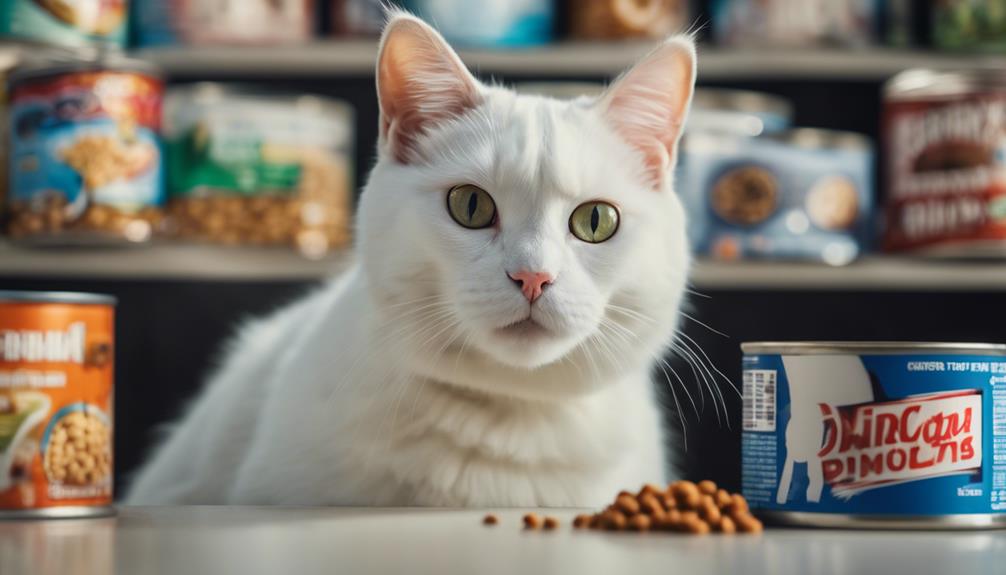
In exploring articles pertaining to feline nutrition, it is essential to consider a range of topics that address the dietary needs and potential hazards for cats. Here are some related articles on cat nutrition that can provide valuable insights for cat owners:
| Article | Topic | Relevance |
|---|---|---|
| Can dogs eat tuna? | Cross-species comparison | Understanding dietary differences |
| Can cats eat bacon? | Human foods for cats | Exploring safe human food options for cats |
| Is salmon good for cats? | Fish in cat diet | Evaluating the benefits of salmon |
| Can cats eat ham? | Meat in feline nutrition | Assessing the risks and benefits of ham |
These articles offer a glimpse into various aspects of cat nutrition, aiding in making informed choices for your feline companion.
Additional Articles on Cat Diet
Exploring further insights into feline dietary considerations, the following articles delve into additional aspects of cat diet beyond the basic nutritional requirements.
- Is bread tasty or toxic for cats?
- Comparison between wet and dry cat food.
- 15 toxic human foods for cats.
- Can cats eat corn?
- Safely feeding fish to cats.
These articles provide valuable information on various topics related to cat diet, ranging from the safety of certain human foods to the benefits of different types of cat food. As a cat owner looking to provide the best care for your feline companion, understanding these additional elements of cat nutrition can help you make informed decisions about what to feed your beloved pet.
Conclusion
In conclusion, the decision to feed tuna to cats requires careful consideration of its nutritional benefits and potential risks. Like a delicate balancing act, pet owners must navigate the complexities of mercury levels, feeding frequency, and serving sizes to ensure their feline companions' well-being.
By approaching tuna as a rare treat rather than a staple in their diet, cat owners can enjoy the benefits of this seafood delicacy while safeguarding their cats' health.




